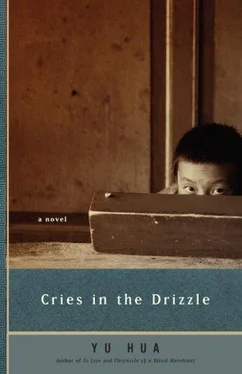This lonely old woman possessed the earnestness and obduracy that were hallmarks of the era. She had been using the same oil bottle for decades, its capacity marked with a line on the outside of the glass. She did not trust the shop assistants, for she said they were always looking somewhere else when they were refilling the bottle. If the clerk overfilled the bottle, she would not be the slightest bit pleased, but would pour some oil out with annoyance. If the clerk failed to fill the bottle all the way up to the mark, then she would not leave until they did. She would stand there for ages, not saying a word, just staring obstinately at the bottle.
It seemed that her husband had gone to his last resting place many years earlier. He had been a strong man, with a strange fondness for snails. He liked to sit in the courtyard in the summer, waving his fan and feasting merrily on snails. During her long widowhood her finest tribute to his memory was not the maintenance of her chastity but rather her punctilious tribute to this predilection of his. When he was alive he claimed all the flesh in the shell, and she happily consumed the unappetizing little muscle at the base. In the several decades since her husband's death she had never once helped herself to snail meat, but contentedly ate the remainders, leaving the flesh to the husband hanging on the wall. For her, habit and remembrance were fused into one.
Guoqing did not like snails, but the old lady would suck them out of their shells with a slurp and lick the juice off her lips afterward, and the more this carried on the more trouble Guoqing had keeping his mouth from watering. His appetite stirring, he tried picking up a piece of snail meat from the table, but the old lady was shocked. She quickly slapped it out of his hand and said menacingly into his ear, “He saw that.”
It was true, in a sense: the dead man on the wall was watching them.
In the spring of the year that I turned twelve, the old lady at last was granted an unbroken slumber. She died in the street outside her house. She and Guoqing had gone out to buy soy sauce, and on her way home her legs seized up. She said she needed to rest a minute, and put her hand against the wall and sat down limply in the sun, clutching the soy sauce bottle to her chest. Guoqing stood next to her, and when she closed her eyes he thought she had fallen asleep. Bored, he looked around for distraction and noticed that grass was sprouting up next to the wall. The bright sun made him squint. At one point the old lady opened her eyes and in a faint voice inquired as to the dog's whereabouts. He saw it lying prone in the middle of the lane, observing them, so he said, “It's right over there.” She gave a deep sigh and closed her eyes again. Guoqing stood for awhile longer, watching with enjoyment as the sunlight played over the wrinkles on her face.
Guoqing told us later that she had lost her way and froze to death. According to him, she had been in too much of a hurry when going to the underworld, and had forgotten the padded jacket and oil lamp. She kept walking and walking along a road so dark you could not see the fingers of your hand, so she lost her way. A cold wind howled in her face, chilling her till she was shivering all over, and when she could not go another inch farther she sat down. That was how she froze.
When he was thirteen, Guoqing finally achieved a degree of personal liberation. He did not want to have to carry his satchel to school and put up with the teacher's endless dronings. When Liu Xiaoqing and the other classmates entered high school, he began to make a living.
By that time I was back in Southgate. As my wretched life at home began, Guoqing was fending for himself, working as a coal deliveryman. Like a real coolie, with a dirty towel hanging from his shoulder pole, his shirt open, grunting with effort, he would carry coal to the doors of his customers. Of his former habits, only the handkerchief in his pocket survived. When he set down a heavy load of coal, the first thing he did was to pull out the handkerchief and swab his lips. Even if sweat was pouring down his face, he just wiped his mouth. A little notebook and a pencil also took up space in his pocket. In his crisp voice, with naive courtesy, he would go from door to door asking if they needed coal. At first his age did not inspire confidence, and scanning his puny frame people would ask, “Can you carry coal?”
A canny smile would appear on Guoqing's face, and he would say, “If you don't let me try, how will you know?”
With his honesty and his careful arithmetic, it did not take long for Guoqing to win the trust of his customers. So vigilant was Guoqing that the shipper at the coal depot found it impossible to take advantage of him when weighing his consignment. In the end, Guoqing's innocent-looking appearance and his tragic circumstances (common knowledge to everyone) led the shipper to develop a soft spot for him, so he always slipped him a few extra pounds of coal. Of course it was the customers who reaped the greatest benefits, and their satisfaction in turn made Guoqing's career blossom. He practically put that rival of his out of business, despite his twenty years of experience in the trade.
I vividly recall Guoqing's fellow professional, for the simple reason that this little man was practically an idiot. Nobody knew what his name was, and he would answer to any name he was called. If he was walking by briskly with a load of coal on his back, he would not respond to our shouts; it was only when he was walking just as quickly, but with empty baskets hanging from his pole, that he would register our greetings earnestly, his head bowed, as we called him by any name we chose. I would call him “Guoqing” or “Liu Xiaoqing,” while they would address him by my name. Off he would go, giving a grunt of acknowledgment, and he never raised his head to look at us. He was always rushing down the street as though he had a train to catch. Once we called him “Toilet” and he answered to that too, reducing us to paroxysms of laughter. Though cavalier about his name, he was meticulous where money was concerned. And his speed in making calculations was astounding: as his customers were just beginning laboriously to compute how much money they owed him, the total was already on his lips. Those figures were the only words that Little-marsh residents ever heard him speak.
Guoqing made fun of him just like the rest of us, never imagining that he himself would wind up in the same line of work. Guoqing's entry into the trade knocked a big hole in the man's rice bowl, and he became less busy than before. This unfortunate fellow began to spend more time carrying empty baskets — still hurrying down the street, but looking more lonesome now that he was less in demand. He seemed not to be the slightest bit jealous of Guoqing, and I suspect he simply lacked the capacity to be so. Devoted to his job, he seldom let a smile appear on his face. After dumping coal into his customer's basket, he would take their broom and dustpan and scrupulously sweep up any coal slack that had fallen on the floor. Then he would lift up his empty pole and walk off, looking very solemn. But once when he saw Guoqing in the street, shouldering a pole identical to his own, he did break into a smile.
Nobody knew how these two became friends, but people began to notice how they would sit, still caked in coal dust, on the opposite sides of a table in the teahouse, drinking tea with smiles on their faces. The man of a million names — or of no name at all— sat like a servant, with both hands resting on his thighs, raising a hand only to lift his teacup to his lips. Guoqing cut a very different figure: he laid a handkerchief next to his cup, and would wipe his lips after every sip. In his tattered and dirty clothes Guoqing looked every inch the young gentleman down on his luck. Although they appeared to all the world like bosom pals, nobody had ever heard them have a conversation.
Читать дальше












